Distributing a heady mix of American-style craft beers to bars and restaurants in Bangkok, Beervana hopes to breathe fresh life into the city’s long stagnant beer scene. But do craft beers really have staying power in a city where lager served with ice is the norm? Adam Purcell spoke to Beervana’s founder, Aaron Grieser, to find out
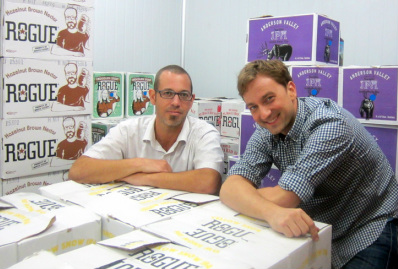
WHEN compared to other cities, Bangkok’s beer scene has always been a bit flat. Dominated by a few key players plying a limited selection of lagers, it can’t hold its head to beer quaffing destinations like London, New York, Berlin and Brussels, where a heady mix of stouts, bitters, pale ales, and wheat beers are readily available, many on draught.
But there are encouraging signs that this is beginning to change. Bars like HOBS, BREW Beers & Ciders, and BeerVault have opened and proved that Bangkok does indeed have a thirst for Belgian beers and international ales; each stocks its shelves with some of the world’s best bottled beers and does a cracking trade every night. Further proof that the city’s fast taking to ale can be seen with the arrival of Beervana, an importer of fine American-style craft beers whose popularity has risen faster than a stormy head in a newly poured glass of grog.
But there are encouraging signs that this is beginning to change. Bars like HOBS, BREW Beers & Ciders, and BeerVault have opened and proved that Bangkok does indeed have a thirst for Belgian beers and international ales; each stocks its shelves with some of the world’s best bottled beers and does a cracking trade every night. Further proof that the city’s fast taking to ale can be seen with the arrival of Beervana, an importer of fine American-style craft beers whose popularity has risen faster than a stormy head in a newly poured glass of grog.
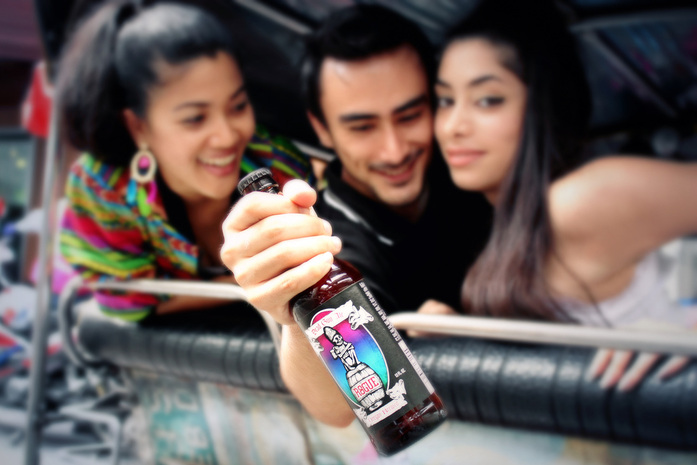
Set up a little over two months ago by Bangkok-based Americans Aaron Grieser and Brian Bartusch, Beervana taps into a global zeitgeist that has seen America’s craft beers pouring into drinks markets all around the world.
“American brewing culture used to be the country’s best kept secret,” says Aaron, Beervana’s Founder and Chief Beer Enthusiast. “But now the secret’s out. And people are quickly discovering that the beer coming from little breweries on America’s West Coast just happens to be some of the best beer in the world.”
Aaron, a former transactional lawyer for an American law firm, developed a real taste for ale growing up in Eugene, Oregon, where, like many of his peers, he would spend time in his basement home brewing experimental beers.
“The city had two huge superstores devoted to home brewing. And I mean huge,” he says. “People are just so into it. Some people were good; some people were great; some people sold their beers in local pubs; and some even went on to open their own craft breweries. One of which we’ve introduced to Thailand – Rogue.”
Aaron didn’t sell his beer in a pub, and he didn’t sell it to a brewery. But he did sell his soul to the devil to practice law (sorry, had to work a lawyer joke in somewhere). And it would be this job that brought him to Thailand nearly four years ago to a desk where the only interaction with the outside world was with opposing council – “not the friendliest people,” he laughs – and to a pub scene devoid of his favourite American craft beers. As home brewing is illegal in Thailand, he couldn’t even make his own.
“It was a dilemma,” he says. “And one that was shared by many American expats in Bangkok. But it planted an idea in my mind and I’d sit at my desk dreaming about bringing craft beers to Thailand and then, I thought, why not? So I started scribbling down ideas, came up with a name for a company, The Secret’s Out, went on an epic beer tour of the States to make friends with brewers, and then I met Brian – and quickly discovered he was going to be a competitor.”
Brian, who originally came to Thailand to manage a boutique resort near Koh Samui, had also grown up in the States where he enjoyed crafting his own beers and, like Aaron, recognized the gap in the market for American craft beers in Thailand. Kindred spirits, the pair formed a quick friendship and, over several glasses of their much-missed beer, forged a partnership: Beervana was born. Craft beers would be coming to Thailand.
Craft brewing traditions
According to the American Brewers Association, three things distinguish a craft brewery. One, it must be small. Two, it must be independent. Three, the beers must be made with all natural ingredients. Aaron also likes to add a fourth – that is, “you have to experiment and innovate like crazy.”
“Experimentation is really what distinguishes American craft beer from European brewing traditions,” he says. “In Europe, brewers pride themselves on not having changed for hundreds of years. While it’s great beer, it’s a lot like going to a brewing museum.
“That’s not the same in America. Everything there is innovative. You have brewers making beers with food and really experimenting with a wide range of ingredients and brewing methods; much like wine.
“Our flagship brewery, for example, is Rogue. They’re based in Newport, Oregon, and they brew a Hazelnut Brown Ale, which is made using actual hazelnuts from Rogue’s own organic plantation. Another Rogue beer we’ll be bringing in is called Voodoo Doughnut Bacon Maple Ale, and this, believe it or not, is a smoked beer made with real bacon.
“Perhaps the strangest one I’ve tried though, from another brewery, is Rocky Mountain Oyster Beer, which is made with bulls’ testicles. We definitely won’t be bringing that one here! (It was gross, and we only bring what we think are great beers). But it just goes to show how creative the craft beer scene is.”
Craft brewers’ quirky experimentation can even be seen in the colourful, modern and often playful labels they use to decorate their bottles. Bright and bold, the labels’ images are far removed from the coats of arms and shields found on many traditional European brews.
Take Anderson Valley Brewing Company’s Imperial IPA for instance. At first glance, the label’s image seems to depict a deer sipping water from a lake. Look closely, though, and you’ll spot the creature is actually a bear with deer antlers. Mix the word bear with deer and what do you get? Beer.
“This label typifies the playful aspect behind the whole craft industry,” explains Aaron. “The brewers are not bound by tradition, not bound by stuffy regulations, so they have the freedom to inject lots of personality into every beer they make.”
“American brewing culture used to be the country’s best kept secret,” says Aaron, Beervana’s Founder and Chief Beer Enthusiast. “But now the secret’s out. And people are quickly discovering that the beer coming from little breweries on America’s West Coast just happens to be some of the best beer in the world.”
Aaron, a former transactional lawyer for an American law firm, developed a real taste for ale growing up in Eugene, Oregon, where, like many of his peers, he would spend time in his basement home brewing experimental beers.
“The city had two huge superstores devoted to home brewing. And I mean huge,” he says. “People are just so into it. Some people were good; some people were great; some people sold their beers in local pubs; and some even went on to open their own craft breweries. One of which we’ve introduced to Thailand – Rogue.”
Aaron didn’t sell his beer in a pub, and he didn’t sell it to a brewery. But he did sell his soul to the devil to practice law (sorry, had to work a lawyer joke in somewhere). And it would be this job that brought him to Thailand nearly four years ago to a desk where the only interaction with the outside world was with opposing council – “not the friendliest people,” he laughs – and to a pub scene devoid of his favourite American craft beers. As home brewing is illegal in Thailand, he couldn’t even make his own.
“It was a dilemma,” he says. “And one that was shared by many American expats in Bangkok. But it planted an idea in my mind and I’d sit at my desk dreaming about bringing craft beers to Thailand and then, I thought, why not? So I started scribbling down ideas, came up with a name for a company, The Secret’s Out, went on an epic beer tour of the States to make friends with brewers, and then I met Brian – and quickly discovered he was going to be a competitor.”
Brian, who originally came to Thailand to manage a boutique resort near Koh Samui, had also grown up in the States where he enjoyed crafting his own beers and, like Aaron, recognized the gap in the market for American craft beers in Thailand. Kindred spirits, the pair formed a quick friendship and, over several glasses of their much-missed beer, forged a partnership: Beervana was born. Craft beers would be coming to Thailand.
Craft brewing traditions
According to the American Brewers Association, three things distinguish a craft brewery. One, it must be small. Two, it must be independent. Three, the beers must be made with all natural ingredients. Aaron also likes to add a fourth – that is, “you have to experiment and innovate like crazy.”
“Experimentation is really what distinguishes American craft beer from European brewing traditions,” he says. “In Europe, brewers pride themselves on not having changed for hundreds of years. While it’s great beer, it’s a lot like going to a brewing museum.
“That’s not the same in America. Everything there is innovative. You have brewers making beers with food and really experimenting with a wide range of ingredients and brewing methods; much like wine.
“Our flagship brewery, for example, is Rogue. They’re based in Newport, Oregon, and they brew a Hazelnut Brown Ale, which is made using actual hazelnuts from Rogue’s own organic plantation. Another Rogue beer we’ll be bringing in is called Voodoo Doughnut Bacon Maple Ale, and this, believe it or not, is a smoked beer made with real bacon.
“Perhaps the strangest one I’ve tried though, from another brewery, is Rocky Mountain Oyster Beer, which is made with bulls’ testicles. We definitely won’t be bringing that one here! (It was gross, and we only bring what we think are great beers). But it just goes to show how creative the craft beer scene is.”
Craft brewers’ quirky experimentation can even be seen in the colourful, modern and often playful labels they use to decorate their bottles. Bright and bold, the labels’ images are far removed from the coats of arms and shields found on many traditional European brews.
Take Anderson Valley Brewing Company’s Imperial IPA for instance. At first glance, the label’s image seems to depict a deer sipping water from a lake. Look closely, though, and you’ll spot the creature is actually a bear with deer antlers. Mix the word bear with deer and what do you get? Beer.
“This label typifies the playful aspect behind the whole craft industry,” explains Aaron. “The brewers are not bound by tradition, not bound by stuffy regulations, so they have the freedom to inject lots of personality into every beer they make.”
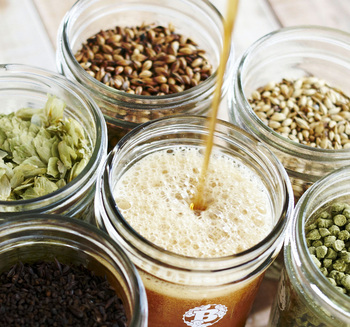
Bringing craft beers to Thailand
“The most fun part of setting up the company was meeting all of the brewers,” says Aaron. “We spent two months going from brewery to brewery to brewery, sampling all of the best beers on the West Coast and trying to get them to sell their product to us.”
“The first problem we had is that the beers we tried are made in limited batches and regularly sell out, so getting the microbreweries to reserve bottles for us was tough. Second, dealing with microbreweries is very much like dealing with chefs. They don’t want anything to go out to the public that’s not perfect; they want the beer we sell in Thailand to taste the same as their beer that’s sold around the corner in America.”
“The most fun part of setting up the company was meeting all of the brewers,” says Aaron. “We spent two months going from brewery to brewery to brewery, sampling all of the best beers on the West Coast and trying to get them to sell their product to us.”
“The first problem we had is that the beers we tried are made in limited batches and regularly sell out, so getting the microbreweries to reserve bottles for us was tough. Second, dealing with microbreweries is very much like dealing with chefs. They don’t want anything to go out to the public that’s not perfect; they want the beer we sell in Thailand to taste the same as their beer that’s sold around the corner in America.”
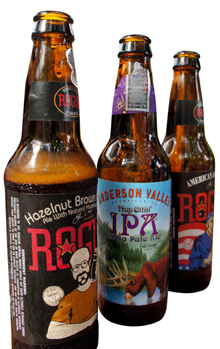
To ensure the beer would reach Thai drinkers at optimum quality, Beervana established a ‘Cold Chain’ concept. This sees them transporting beers in refrigerated containers from the breweries in America to a cold storage unit in the heart of Bangkok – throughout the journey, the beer remains at eight degrees Celsius.
“Our aim is to preserve the finest brewery taste. You know, these beers are not filtered, not pasteurized. They have a short shelf life. That’s why they have maximum flavour. We preserve that. We keep the bottles cold, and this means we have some of the freshest, youngest imported beers in Bangkok.”
But, like all good things, the cold chain concept comes at a price.
“As you can imagine, the refrigeration costs are huge” says Aaron. “On top of this there is the nearly 400% tax (the same as wine), and as we keep our pricing in line with premium Belgian beers, it’s difficult to make any profit. This is why we have to focus on a volume of sales.
“We don’t want to get too big though – we aim to supply a maximum of 25-30 bars and restaurants and keep it at that. This way we can maintain optimum levels of service and quality – and have a ball while doing it too.”
So far, signs for success look good. Beervana’s first shipment, which arrived just over two months ago, contained 14,000 bottles, a mix of ales from Rogue and Anderson Valley, which were distributed to just over 12 bars and restaurants in Bangkok. This month, the company will be bringing in over 20 types of beer, and distributing to nearly 25 bars and restaurants. Beervana will also bring in locally-sourced craft beers from Singapore from a brewery called Brewerkz (“one of the best beers in Southeast Asia,” according to Aaron), which will be available on draught in Roadhouse BBQ and Smith.
“Our aim is to preserve the finest brewery taste. You know, these beers are not filtered, not pasteurized. They have a short shelf life. That’s why they have maximum flavour. We preserve that. We keep the bottles cold, and this means we have some of the freshest, youngest imported beers in Bangkok.”
But, like all good things, the cold chain concept comes at a price.
“As you can imagine, the refrigeration costs are huge” says Aaron. “On top of this there is the nearly 400% tax (the same as wine), and as we keep our pricing in line with premium Belgian beers, it’s difficult to make any profit. This is why we have to focus on a volume of sales.
“We don’t want to get too big though – we aim to supply a maximum of 25-30 bars and restaurants and keep it at that. This way we can maintain optimum levels of service and quality – and have a ball while doing it too.”
So far, signs for success look good. Beervana’s first shipment, which arrived just over two months ago, contained 14,000 bottles, a mix of ales from Rogue and Anderson Valley, which were distributed to just over 12 bars and restaurants in Bangkok. This month, the company will be bringing in over 20 types of beer, and distributing to nearly 25 bars and restaurants. Beervana will also bring in locally-sourced craft beers from Singapore from a brewery called Brewerkz (“one of the best beers in Southeast Asia,” according to Aaron), which will be available on draught in Roadhouse BBQ and Smith.
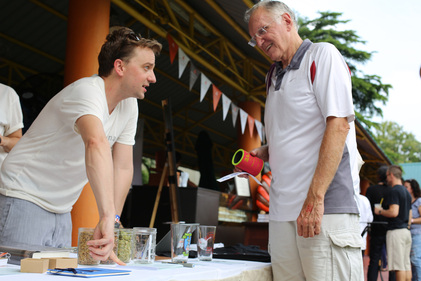
Craft beers here to stay?
“One of the most common questions I get asked is ‘do Thai consumers like craft beers?’” says Aaron. “But that’s the wrong question. The real question is, ‘which craft beers do they like?’
“There’s so much variety in craft beers that there really is something for everyone. Sweet, bitter, strong, weak – there’s really the full gamut of flavours and styles. I recently went to the Great American Beer Festival in Colorado, for example, and there were over 2,700 craft beers on tap. That’s a lot of beer, and each one was different.
“In America, 70% of new craft beer drinkers are former wine drinkers. They appreciate how, like wine, craft beer can be paired with different foods and enjoyed for its rich, complex flavours. And that’s an encouraging model if you apply it to Bangkok, where there’s been a recent wine bar boom. And craft beer is so much more accessible than wine. The Thais always seem to want to try something different, something new. All the precursors are here for a craft beer explosion.”
To start the clock ticking on Aaron’s predicted craft beer bomb, Beervana has focused heavily on promotion. Beer dinners paired with exotic cuisine have been held at WTF’s popular pop up restaurant, Opposite; beer tastings have been hosted at Brew; and a Hawaiian theme party, with free-flow beer and innovative food pairings by Eat Me’s Chef Tim Butler, was held last month at Flow House’s inner-city beach bar.
To showcase the many beer and food pairing possibilities, Beervana plans to team up with great chefs across Bangkok to host special events such as a vegetarian pairing dinner, a barbecue and IPA pairing dinner, and a modern Thai dinner, to name a few. In October, they also plan to hold the country’s first craft beer festival, a one-day event bringing together some of the world’s best craft beers and brewers.
“We’re by no means the first people to try to bring craft beer to Bangkok,” says Aaron. “But we’ve definitely made it the furthest. And while there’s no guarantee for success, especially due to the massive overheads, we will do our very best to ensure that the company works. I, for one, hope it does, because I can’t imagine there’s any other job as fun and exciting as this. And it sure beats practicing law! ”
For a full list of Beervana’s beers and the places you can buy them, visit: www.seekbeervana.com
“One of the most common questions I get asked is ‘do Thai consumers like craft beers?’” says Aaron. “But that’s the wrong question. The real question is, ‘which craft beers do they like?’
“There’s so much variety in craft beers that there really is something for everyone. Sweet, bitter, strong, weak – there’s really the full gamut of flavours and styles. I recently went to the Great American Beer Festival in Colorado, for example, and there were over 2,700 craft beers on tap. That’s a lot of beer, and each one was different.
“In America, 70% of new craft beer drinkers are former wine drinkers. They appreciate how, like wine, craft beer can be paired with different foods and enjoyed for its rich, complex flavours. And that’s an encouraging model if you apply it to Bangkok, where there’s been a recent wine bar boom. And craft beer is so much more accessible than wine. The Thais always seem to want to try something different, something new. All the precursors are here for a craft beer explosion.”
To start the clock ticking on Aaron’s predicted craft beer bomb, Beervana has focused heavily on promotion. Beer dinners paired with exotic cuisine have been held at WTF’s popular pop up restaurant, Opposite; beer tastings have been hosted at Brew; and a Hawaiian theme party, with free-flow beer and innovative food pairings by Eat Me’s Chef Tim Butler, was held last month at Flow House’s inner-city beach bar.
To showcase the many beer and food pairing possibilities, Beervana plans to team up with great chefs across Bangkok to host special events such as a vegetarian pairing dinner, a barbecue and IPA pairing dinner, and a modern Thai dinner, to name a few. In October, they also plan to hold the country’s first craft beer festival, a one-day event bringing together some of the world’s best craft beers and brewers.
“We’re by no means the first people to try to bring craft beer to Bangkok,” says Aaron. “But we’ve definitely made it the furthest. And while there’s no guarantee for success, especially due to the massive overheads, we will do our very best to ensure that the company works. I, for one, hope it does, because I can’t imagine there’s any other job as fun and exciting as this. And it sure beats practicing law! ”
For a full list of Beervana’s beers and the places you can buy them, visit: www.seekbeervana.com

 RSS Feed
RSS Feed
















